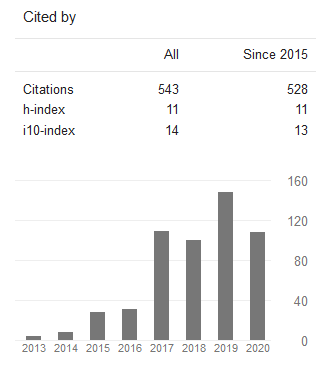Analisis Sentimen pada Indeks Kinerja Dosen Fakultas SAINTEK UIN Sunan Kalijaga Menggunakan Naive Bayes Classifier
DOI:
https://doi.org/10.24002/jbi.v10i2.2250Abstract
Abstract.
UIN Sunan Kalijaga Yogyakarta has a lecturer performance appraisal system commonly referred to as IKD (Lecturer Performance Index) in the Academic Information System. At the end of semester, students give the assessment by filling in a questionnaire concerning judgement and suggestion towards the campus learning activities. The questionnaire results may reveal which are the negative, neutral or positive sentiments by conducting sentiment analysis. The sentiment analysis used is Naive Bayes Classifier. In this study, 8249 data were used, with the composition of 3000 training data with labels and 5249 test data without labels. The sentiment analysis of the critical data and suggestions of the IKD resulted in greater accuracy using the TF-IDF weighting, which was 73.9% compared to TF weighting which was 72.8%. This accuracy value is obtained from 3000 training data that has been labeled using the evaluation method of the K-Fold Cross Validation classification model.
Keywords: Sentiment Analysis, IKD (Lecturer Performance Index), Naive Bayes Classifier, K-fold cross validation.
Abstrak.
UIN Sunan Kalijaga Yogyakarta memiliki sistem penilaian kinerja dosen yang biasa disebut dengan IKD (Indeks Kinerja Dosen) pada Sistem Informasi Akademik. Pada akhir semester, para mahasiswa akan memberikan penilaian dengan mengisi kuesioner mengenai kritik dan saran bagi kegiatan perkuliahan. Data-data dari hasil kuesioner yang didapat bisa menunjukkan apakah adanya sentimen negatif, netral, ataupun positif dengan cara melakukan analisis sentimen. Analisis sentimen yang dipergunakan adalah Naive Bayes Classifier. Penelitian ini menggunakan 8249 data dengan komposisi 3000 data latih dengan label dan 5249 data uji tanpa label. Analisis sentimen data kritik dan saran IKD ini menghasilkan akurasi yang lebih besar menggunakan pembobotan TF-IDF yaitu 73,9% dibandingkan dengan pembobotan TF yaitu 72,8%. Nilai akurasi ini didapatkan dari 3000 data latih yang sudah diberi label menggunakan metode evaluasi model klasifikasi K-Fold Cross Validation.
Kata Kunci: Analisis Sentimen, Indeks Kinerja Dosen, Naive Bayes Classifier, K-Fold Cross Validation
References
A. P. M. Adji Sigit Sutedjo, “Pengaruh Kompetensi dan Motivasi Kerja terhadap Kinerja Karyawan di PT. Inti Kebun Sejahtera,” BISMA, J. Bisnis dan Manaj., vol. 5, no. 2, 2013.
F. A. Hermawati, Data Mining. Yogyakarta: ANDI, 2013.
L. Oktasari, Y. H. Chrisnanto, and R. Yuniarti, “Text Mining Dalam Analisis Sentimen Asuransi Menggunakan Metode Niave Bayes Classifier,” Pros. SNST, vol. 7, pp. 37–42, 2016.
E. T. L. Kusrini, Algoritma Data Mining. Yogyakarta: ANDI, 2009.
A. Fathan Hidayatullah, A. Sn, J. Teknik, I. Fakultas, and T. Industri, “Analisis Sentimen Dan Klasifikasi Kategori Terhadap Tokoh Publik Pada Twitter,” Semin. Nas. Inform., vol. 2014, no. semnasIF, pp. 115–122, 2014.
J. LING, I. P. E. N. KENCANA, and T. B. OKA, “Analisis Sentimen Menggunakan Metode Naïve Bayes Classifier Dengan Seleksi Fitur Chi Square,” E-Jurnal Mat., vol. 3, no. 3, p. 92, 2014.
A. Hamzah, “Sentiment Analysis Untuk Memanfaatkan Saran Kuesioner Dalam Evaluasi Pembelajaran Dengan Menggunakan Naive Bayes Classifier (NBC),” Snast, vol. 3, no. November, pp. 211–216, 2014.
G. A. Buntoro, “Analisis Sentimen Calon Gubernur DKI Jakarta 2017 Di Twitter,” Integer J. Maret, vol. 1, no. 1, pp. 32–41, 2017.
D. Gunawan, “Evaluasi Performa Pemecahan Database dengan Metode Klasifikasi Pada Data Preprocessing Data mining,” Khazanah Inform. J. Ilmu Komput. dan Inform., vol. 2, no. 1, p. 10, 2017.
R. Deden and R. Nina, “Analisis Sentimen Pasar Otomotif Mobil: Tweet Twitter Menggunakan Naïve Bayes,” Simetris, vol. 8, no. 1, pp. 113–120, 2017.
E. Prasetyo, Data Mining Konsep dan Aplikasi Menggunakan Matlab. ANDI Publisher, 2012.
P. H. Saputro, M. Aristian, and D. ListianingTyas, “Klasifikasi lagu Daerah Indonesia Berdasarkan lirik menggunakan metode Tf-Idf Dan Naïve Bayes,” J. Teknol. Inf. dan Terap., vol. 4, no. 1, pp. 47–52, 2019.
Downloads
Published
Issue
Section
License
Copyright of this journal is assigned to Jurnal Buana Informatika as the journal publisher by the knowledge of author, whilst the moral right of the publication belongs to author. Every printed and electronic publications are open access for educational purposes, research, and library. The editorial board is not responsible for copyright violation to the other than them aims mentioned before. The reproduction of any part of this journal (printed or online) will be allowed only with a written permission from Jurnal Buana Informatika.
This work is licensed under a Creative Commons Attribution-ShareAlike 4.0 International License.










